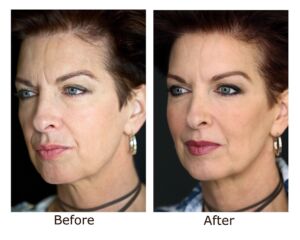Juvederm Voluma is another excellent product from the Juvederm line of soft tissue fillers. It has become an important part of the anti-aging arsenal for men and women who have lost volume in the mid-face. Â Juvederm restores youthful volume, and make the cheeks prominent once again.
What is Juvederm Voluma?
Juvederm Voluma is a deep volumizing dermal filler made of hyaluronic acid, which is a substance that occurs naturally in the skin. Juvederm is designed to smooth the skin and restore facial contours, and is approved by the FDA for augmentation of the mid-face (cheek area), in adults over the age of 21.  Treatment is virtually painless, as Juvederm is infused with lidocaine, a local anesthetic.
What does Juvederm treat?
Juvederm Voluma is specially formulated to replenish volume in the cheeks, and contour the face.
How does it work?
Juvederm Voluma is injected deep into the tissues where, it replenishes volume by binding itself to the water molecules in the skin, and simulating collagen. This not only helps to fill in the space and pop up the skin, it also gives a slight lift to the lower half of the face.
How many treatments do you need?
It usually takes one treatment of Juvederm to create a marked improvement in the appearance of your cheeks. Â The volumizing effects of Juvederm typically last 18-24 months.
Is Juvederm Safe?
The manufacturers maintain the safety and effectiveness of Juvederm Voluma, as long as it is injected in the established area, i.e. the midface region. Safety is further ensured when Juvederm injections are administered as directed by an experienced provider, with an understanding of facial aesthetics and bone structure.
Pre-Procedure Instructions
If you have not been prescribed aspirin or other blood thinners by your physician for the treatment of a known cardiovascular disease, avoid taking aspirin or Non-Steroidal Anti–Inflammatory Drugs (NSAIDS) such as Advil® or Motrin® for 5-7 days prior to the procedure, as these medications increase the tendency of bleeding and bruising.
Avoid Vitamin E, Fish Oil, Ginko Biloba, St Johns Wart, Ginseng, and Garlic for 5-7 days prior to the procedure. These medications and herbs increase the tendency of bleeding and bruising.
Arnica, a natural supplement (found at any health food store) can be taken for 3-4 days prior to treatment to help minimize bruising and swelling. We recommend taking tablets orally, but there is also a topical form available.  Any severe pain or visual disturbance must be reported to us immediately.
Avoid alcohol 2 days prior to the procedure. Alcohol may cause blood vessels to dilate and cause more bruising.
Do not wear makeup in the treatment area on the day of treatment.
Post-Procedure Instructions (24-48 hours after treatment)
Avoid strenuous exercise after the procedure. This may raise your blood pressure and pulse causing more bruising and swelling.
Avoid excessive heat from saunas, hot showers, or the hot sun. This may cause your blood vessels to dilate and cause more bleeding and bruising.
Avoid direct sunlight for prolonged periods of time. Wear a physical sunblock daily. Be sure that it is a physical sunblock that contains Titanium and/or Zinc Oxide.
Avoid drinking alcohol. Alcohol may cause the blood vessels to dilate and cause more bruising.
If lips are treated, avoid drinking from a straw.
Do not massage the area treated or receive a massage (with your face in a massage cradle) for 2 weeks after treatment.
Avoid Vitamin E, Fish Oil, Ginko Biloba, St Johns Wart, Ginseng, and Garlic. These medications and herbs increase the tendency of bleeding and bruising.
You may apply make-up after the procedure.
You may apply cold compresses to the treatment sites to reduce swelling and bruising.
Arnica, a natural supplement (found at any health food store) can be taken to help minimize bruising and swelling. We recommend taking tablets orally, but there is also a topical form available. Any severe pain or visual disturbance must be reported to us immediately.
As with any injection, there may be small bumps at the injection site. There may also be mild swelling, itching, pain, or redness. These symptoms typically resolve with 24 – 48 hours.

